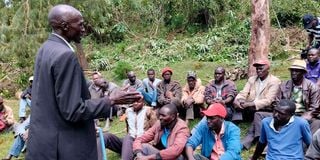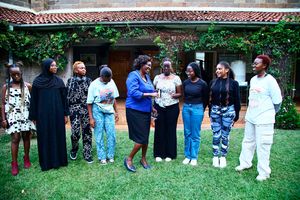Unlikely champions - Meet the male mentors reshaping gender norms

Thomas Chepkiyeng, the chairperson of Kwo-Kwop Boi men’s forum in Elgeyo Marakwet County, addresses a meeting of elders and young men at Kapkong’a village, Keiyo North Constituency in 2022.
What you need to know:
- The Kwo-Kwop Boi forum in Elgeyo-Marakwet county exemplifies a shift, where elders mentor young men to become advocates for women's rights and empowerment.
- This male engagement strategy, now recognised at the national level, aims to transform social norms and accelerate progress towards ending gender-based violence by 2026.
In the rolling hills of Elgeyo-Marakwet County, a quiet revolution is taking place. Under the shade of ancient trees, young men gather to listen intently to their elders. But this is no ordinary meeting. This is Kwo-Kwop Boi, a forum where age-old traditions are being reshaped to protect and empower women and girls.
Thomas Chepkiyeng, the chairman of Kwo-Kwop Boi, beams with pride as he speaks about the changes he's witnessing.
"Through our discussions with the young men from the Keiyo community, things are changing," he says.
"Many are now marrying girls who are not cut to be their wives."
This shift represents a seismic change in a region where female genital mutilation (FGM), child marriage, and domestic violence have long been prevalent.
But Kwo-Kwop Boi – which means "a cultural site where men meet" in the local Kalenjin language – is turning the tide by transforming men from custodians of harmful practices into champions of change.
The initiative in Elgeyo-Marakwet is not an isolated case.
Across Kenya, a growing movement is recognising the crucial role men must play in ending gender-based violence and promoting equality.
Last week in Nairobi, UN Women and the Advocates for Social Change Kenya (ADSOCK) organised a Men Engagement Capacity Enhancement training, bringing together activists, civil society organisations, and journalists to discuss strategies for male involvement.

Faith Nashipae is a leading men and boychild champion in the country. She is also the co-founder of Thriving Communities Africa, the organisation behind the Nitasimama Imara Boys and Men's Program.
Faith Nashipae, a leading men and boy child champion, emphasises the importance of this approach.
"Male engagement and inclusion is a newly established thematic area under the Gender Sector Kenya," she explains.
"This positions Kenya as the first nation globally to establish structures for engagement and inclusion of men and boys towards the achievement of gender equality."
The timing couldn't be more critical. Kenya has set an ambitious goal to end gender-based violence by 2026. Achieving this target will require addressing deeply entrenched social norms and behaviours – a task that cannot be accomplished without men's active participation.

Tony Mwebia the founder of Men End FGM.
Tony Mwebia, founder of Men End FGM Foundation, puts it bluntly: "It is very crucial that we engage men as a country in order to fight the deeply entrenched patriarchy and masculinity. This will help us to cultivate the culture of positive masculinity that is paramount for the gender equality push."
The stakes are high. Globally, one in three women experiences physical or sexual violence in their lifetime.
In Kenya, harmful practices like FGM continue to threaten girls' health, education, and futures. By involving men in the fight against these practices, initiatives like Kwo-Kwop Boi are tackling the problem at its root.
Read also: Men pivotal in ending gender-based violence
"We have to involve men to curb violence in relationships and thereby end domestic violence and gender-based violence," says Kennedy Otina, Executive Director of Masculinity Institute Kenya.

Masculinity Institute Kenya Executive Director Kennedy Otina during an interview in his office in Nairobi on January 24, 2024.
This sentiment is echoed by Dan Bazira, UN Women Country Deputy Director, who stresses the need to "create more awareness on the role of boys and men in achieving gender equality and ending harmful cultural practices."
Back in Elgeyo-Marakwet, the impact of male engagement is already visible. Young men mentored through Kwo-Kwop Boi are becoming agents of change in their communities, challenging long-held beliefs and standing up for women's rights. The forum also empowers men through social-economic activities like tree planting, creating a holistic approach to community development.
As Chepkiyeng reflects on their progress, his vision is clear: "Our goal is to see a community where both men and women are living in harmony without any discrimination."
From rural forums to national policy discussions, the country is pioneering a new approach to gender equality – one that recognises men not just as part of the problem, but as essential partners in the solution.
As this movement grows, it offers hope for a future where harmful practices are consigned to history, and where men and women stand together as equals.
In the words of UN Women's Bazira, "We need men and boys in the country's gender equality push."



